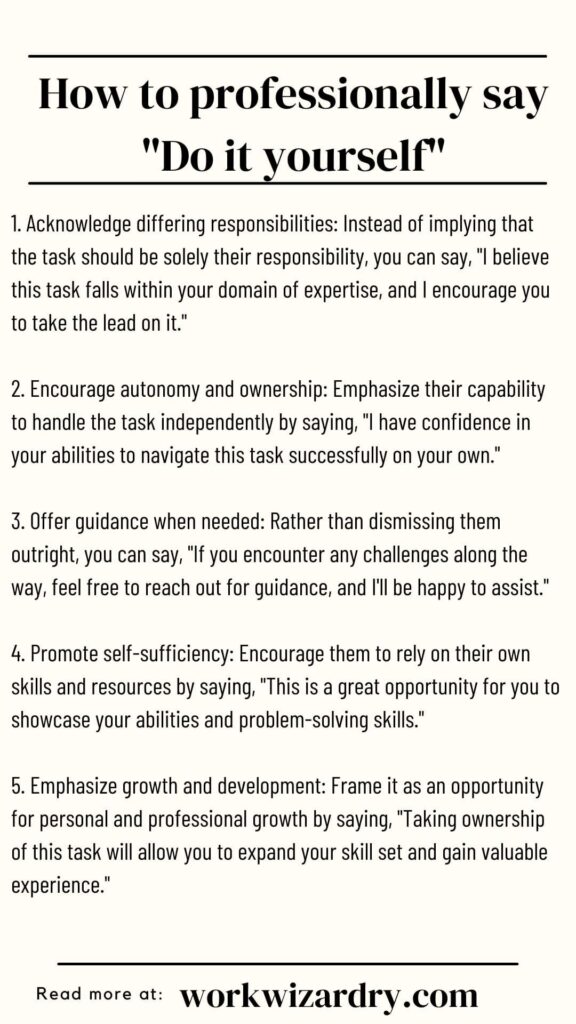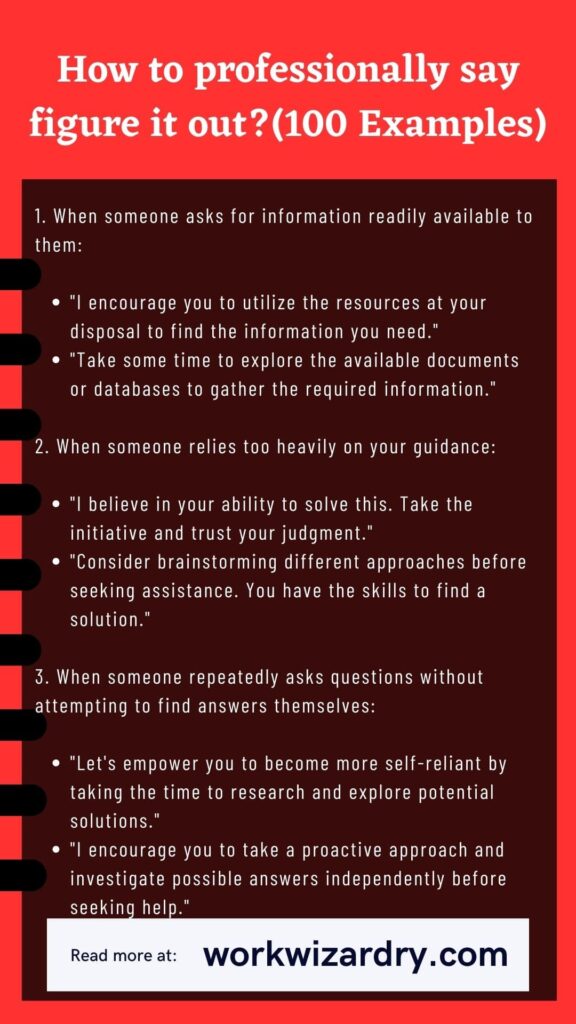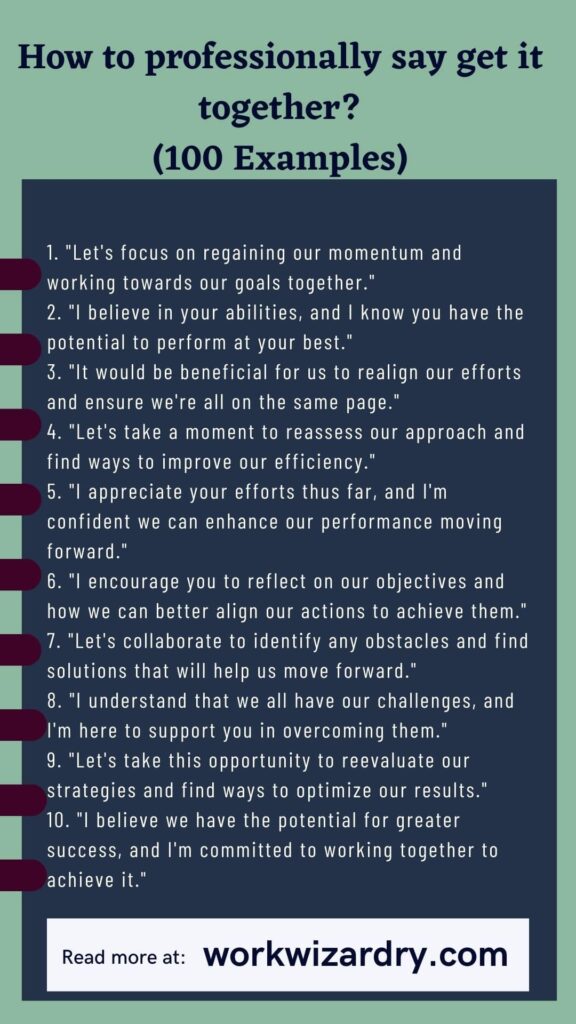In any workplace, effective communication plays a pivotal role in fostering a productive and harmonious environment.
Sometimes, we find ourselves needing to convey messages that touch on personal responsibility, self-reliance, or the need for colleagues to take ownership of their tasks.
However, expressing these sentiments in a professional and tactful manner can be challenging.
That’s why we’ve put together this guide, how to professionally say do it yourself and also offers alternative phrases and strategies for communicating the idea of “do it yourself” or “it’s your responsibility” or “Do your job” or asserting responsibility without sounding brusque or confrontational.
Discover how to skillfully navigate these scenarios and promote a culture of collaboration and accountability in the workplace.
Join us as we delve into various professional ways to convey these messages, such as expressing ownership, requesting personal involvement, encouraging self-sufficiency, and promoting problem-solving skills.
Let’s explore the art of diplomatic communication that empowers individuals and strengthens team dynamics, ultimately leading to increased productivity and mutual respect.
Table of Contents

How to professionally say do it yourself?
When engaging in professional conversations, it’s important to prioritize respectful and constructive communication, even when expressing the need for someone to take independent action.
Rather than resorting to dismissive or derogatory remarks, you can adopt diplomatic language to convey the message. Here’s a guide on how to professionally say do it yourself.
1. Acknowledge differing responsibilities: Instead of implying that the task should be solely their responsibility, you can say, “I believe this task falls within your domain of expertise, and I encourage you to take the lead on it.”
2. Encourage autonomy and ownership: Emphasize their capability to handle the task independently by saying, “I have confidence in your abilities to navigate this task successfully on your own.”
3. Offer guidance when needed: Rather than dismissing them outright, you can say, “If you encounter any challenges along the way, feel free to reach out for guidance, and I’ll be happy to assist.”
4. Promote self-sufficiency: Encourage them to rely on their own skills and resources by saying, “This is a great opportunity for you to showcase your abilities and problem-solving skills.”
5. Emphasize growth and development: Frame it as an opportunity for personal and professional growth by saying, “Taking ownership of this task will allow you to expand your skill set and gain valuable experience.”
It’s important to encourage independence and personal accountability without sounding dismissive or unhelpful.
When faced with a situation where you need to convey the message of “do it yourself” in a professional manner, you can also express it by emphasizing individual responsibility and growth.
For example, you can say, “I encourage you to take ownership of this task as it presents a valuable opportunity for personal development and empowerment. Feel free to leverage available resources, ask clarifying questions, and demonstrate your abilities in handling this independently. However, please know that I am here to support you if you encounter any specific challenges along the way.”

100+ Professional ways to say do it yourself or do your job or it is your responsibility
Here are some of the polite, respectful and professional ways to say do it yourself or tell your coworker to their job or it is their responsibility:
1. “Perhaps this is an opportunity for you to take charge and handle it on your own.”
2. “I trust that you have the ability to tackle this task independently.”
3. “This task presents a great opportunity for you to showcase your self-sufficiency.”
4. “You may have to consider handling it independently.”
5. “I had thought that you would be able to handle this task on your own without needing assistance.”
6. “It might be best for you to take the lead on this particular task.”
7. “I had hoped that you would take the initiative to handle this task independently.”
8. “I was expecting you to handle this task on your own without needing guidance.”
9. “Have you thought about taking ownership of this and completing it on your own?”
10. “I suggest that you take the initiative and handle this on your own.”
11. “I believe this is an opportunity for you to demonstrate your independent capabilities.”
12. “It would be beneficial for you to take on this task and work on it independently.”
13. “I encourage you to take ownership of this task and complete it on your own.”
14. “It’s concerning that you’re not taking the lead on this task and delegating it to others.”
15. “I had hoped that you would have the confidence to tackle this task independently.”
16. “I’m a little disappointed that you’re not showing more self-sufficiency in handling this task.”
17. “I expected more initiative from you in taking on this task independently, but I’m still here to support you if you need it.”

How to professionally say this is your responsibility?
Here are some professional ways to say this is your responsibility:
1. When someone asks you to complete a task they are capable of doing:
What not to say: “I’m not doing it. Figure it out yourself.”
What to say instead in a professional way: “I believe you have the skills and expertise to handle this task on your own. It would be a great opportunity for you to showcase your abilities.”
2. When someone relies on you excessively and needs to take more responsibility:
What not to say: “I’m tired of doing everything for you. Do it yourself!”
What to say instead in a professional way: “I think it’s important for you to take more ownership and initiative in handling this matter. It will empower you to develop new skills and become more self-reliant.”
3. When someone expects you to solve a problem that they can address themselves:
What not to say: “Why can’t you handle it? Figure it out yourself!”
What to say instead in a professional way: “I believe you have the capability to find a solution to this problem. I encourage you to take the lead and explore possible options. If you need guidance along the way, I’m here to support you.”
4. When someone tries to delegate their responsibilities to you:
What not to say: “I’m not doing your work. Do it yourself!”
What to say instead in a professional way: “I understand your workload, but it’s important for each of us to fulfill our own responsibilities. By managing your tasks independently, you can gain valuable experience and grow in your role.”
5. When someone consistently relies on you for assistance without attempting to do it themselves:
What not to say: “Stop depending on me. Do it yourself!”
What to say instead in a professional way: “I believe in your abilities, and I think it’s important for you to take the lead on this. I encourage you to try and resolve the issue independently. If you encounter any challenges, I’m here to provide guidance.”
How to tell coworkers you need to do that yourself in a professional way?
These are a few examples on how to tell coworkers you need to do that yourself in a polite and respectful manner:
6. When someone asks you to do something they should be doing themselves:
What not to say: “Can’t you see I’m busy? Do it yourself!”
What to say instead in a professional way: “I have several pressing tasks at the moment, and I believe you have the capacity to handle this one on your own. It will allow you to develop your skills further.”
7. When someone consistently relies on you for answers without attempting to find them themselves:
What not to say: “Stop bothering me. Figure it out yourself!”
What to say instead in a professional way: “I encourage you to explore possible solutions independently first. It will help you build problem-solving skills, and I’m happy to provide guidance if needed.”
8. When someone expects you to handle their part of a shared project:
What not to say: “I’m not doing your work. Do it yourself!”
What to say instead in a professional way: “To ensure fair distribution of responsibilities, I think it’s important for each team member to manage their assigned tasks. Let’s collaborate to meet our shared project goals.”
9. When someone asks you to cover for them repeatedly:
What not to say: “I’m not covering for you anymore. Do it yourself!”
What to say instead in a professional way: “Taking ownership of your tasks and commitments is essential. It will allow you to build trust and showcase your capabilities. I’m confident you can handle it.”
10. When someone constantly seeks your approval or validation instead of making decisions themselves:
What not to say: “Can’t you make a decision? Do it yourself!”
What to say instead in a professional way: “I believe in your ability to make sound decisions. Taking ownership of your choices will empower you and strengthen your decision-making skills. I’m here to provide support if needed.”
Also read: 100 Classy way to tell someone off
How do I politely tell my coworker he can do the work himself?
11. When someone constantly relies on you for assistance without making an effort to learn:
What not to say: “I can’t keep doing everything for you. Do it yourself!”
What to say instead in a professional way: “I believe in your ability to learn and grow. It’s important for you to take the initiative and develop the necessary skills. I’m here to guide you along the way.”
12. When someone asks you to complete a task that falls outside of your responsibilities:
What not to say: “Why should I do it? Do it yourself!”
What to say instead in a professional way: “I think it would be more appropriate for the person responsible for that area to handle the task. I suggest reaching out to them for assistance.”
13. When someone constantly depends on you for emotional support or validation:
What not to say: “Can’t you handle your own emotions? Do it yourself!”
What to say instead in a professional way: “It’s important to develop emotional resilience and self-care practices. I encourage you to explore ways to manage your emotions independently while seeking support from trusted resources when needed.”
14. When someone expects you to handle their personal tasks during work hours:
What not to say: “I’m not your personal assistant. Do it yourself!”
What to say instead in a professional way: “I believe it’s essential to maintain boundaries between personal and professional tasks. I encourage you to manage your personal responsibilities outside of work hours.”
15. When someone asks you to provide them with information readily available to them:
What not to say: “Can’t you find it yourself? Do it yourself!”
What to say instead in a professional way: “The information you’re looking for is readily available to you. I encourage you to utilize the available resources to access it. If you need assistance navigating those resources, I’m here to help.”
How to tell a coworker to do their job in a polite and professional way?
1. Choose an appropriate setting: Find a private and comfortable space where you can have a one-on-one conversation without interruptions.
Example: “John, I’d like to discuss your recent projects. Could we find a quiet place to talk?”
2. Remain calm and composed: Approach the conversation with a calm demeanor to prevent unnecessary tension or defensiveness.
Example: “I wanted to discuss a concern I have regarding some incomplete tasks, and I believe we can resolve it together.”
3. Use “I” statements: Express your concerns using “I” statements to avoid sounding accusatory. This keeps the focus on how their actions impact you and the team.
Example: “I have noticed that some deadlines have been missed, which has made it challenging for our team to meet our overall goals.”
4. Be specific and objective: Clearly highlight the tasks or responsibilities that have been neglected or require attention. Use specific examples to illustrate your point.
Example: “In the past week, I noticed that the reports for the XYZ project were not completed, and it caused delays in our progress.”
5. Emphasize the impact: Explain how their incomplete work or delays affect the team, projects, or deadlines. Help them understand the importance of everyone fulfilling their duties.
Example: “When tasks are not completed on time, it puts additional pressure on the rest of the team to make up for the delay and may compromise the quality of our work.”
6. Offer assistance or clarification: If they are struggling with their tasks, offer your support or suggest resources that may help them overcome any challenges.
Example: “If you need any clarification or additional resources to help you complete your tasks, please let me know. I’m here to support you.”
7. Seek their perspective: Give them an opportunity to share any concerns or obstacles they may be facing that have contributed to the issue. Listen attentively and try to find a resolution together.
Example: “I wanted to hear your thoughts on the challenges you might be facing that have led to these delays. Understanding your perspective will help us find the best solutions.”
8. Set clear expectations: Reinforce the importance of meeting job responsibilities and outline expectations for future performance.
Example: “Moving forward, let’s ensure that we adhere to the established deadlines and communicate any potential roadblocks early. This will help us maintain a smooth workflow.”
9. Provide constructive feedback: Offer constructive feedback on how they can improve their performance or address the specific areas where they are falling behind. Focus on actionable steps they can take to meet expectations.
Example: “To improve your performance, I suggest setting priorities and breaking down tasks into manageable steps. This approach will help you stay on track and meet deadlines.”
10. Maintain a positive tone: Maintaining a positive tone is crucial when addressing a coworker about their job performance. It helps to foster a constructive and supportive environment, allowing for open communication and collaboration. By maintaining a positive tone, you can:
Example: “I believe that with your skills and expertise, you can effectively meet the expectations of your role. Your contributions are valued, and I know you can succeed.”
11. Encourage open communication: Create an environment where they feel comfortable discussing challenges or seeking guidance. Encourage them to communicate early if they foresee any difficulties meeting deadlines or fulfilling tasks.
Example: “If you encounter any challenges or foresee difficulties in meeting a deadline, please don’t hesitate to reach out to me. Let’s keep communication lines open to address issues proactively.”
12. Highlight their strengths: Acknowledge their strengths and past accomplishments to maintain a balanced perspective. Remind them of their potential and the value they bring to the team when they perform their job effectively.
Example: “I’ve noticed your attention to detail in previous projects, and I believe that when you perform at your best, you make a significant impact. Let’s focus on leveraging those strengths.”
13. Offer support or resources: If there are resources, training opportunities, or additional assistance available, make them aware of those options. This can help them enhance their skills and perform their job more effectively.
Example: “We have training sessions next week that could enhance your skills in time management and task prioritization. Attending those sessions might be beneficial for your professional growth.”
14. Focus on collaboration: Emphasize the importance of teamwork and collaboration within the workplace. Discuss how their contribution is vital to the success of the team.
Example: “By completing your tasks promptly, you contribute to our team’s success. Together, we can achieve our goals more efficiently and ensure a positive work environment.”
15. End on a positive note: Ending the conversation on a positive note is essential when addressing a coworker about their job performance. It helps to leave a lasting impression and ensures that the interaction remains constructive and supportive.
Example: “I have confidence in your abilities, and I know that by addressing this issue, you will excel in your role. I’m here to support you along the way and help you succeed.”
Also read: How to tell someone to go away politely? (125 Example phrases with professional communication tips)

How to professionally say figure it out?
While it’s important to maintain professionalism in communication, it’s generally best to avoid using passive-aggressive language in the workplace.
However, I can provide you with professional and constructive ways to encourage someone to figure things out independently, based on different situations:
1. When someone asks for information readily available to them:
- “I encourage you to utilize the resources at your disposal to find the information you need.”
- “Take some time to explore the available documents or databases to gather the required information.”
2. When someone relies too heavily on your guidance:
- “I believe in your ability to solve this. Take the initiative and trust your judgment.”
- “Consider brainstorming different approaches before seeking assistance. You have the skills to find a solution.”
3. When someone repeatedly asks questions without attempting to find answers themselves:
- “Let’s empower you to become more self-reliant by taking the time to research and explore potential solutions.”
- “I encourage you to take a proactive approach and investigate possible answers independently before seeking help.”
4. When someone expects you to solve their problems without putting in effort:
- “To foster growth and development, it’s important for you to take ownership of solving this challenge.”
- “I believe in your problem-solving abilities. Take the opportunity to explore different strategies and present your findings.”
5. When someone is overly dependent on your expertise:
- “Consider utilizing your own knowledge and experience to tackle this. I have confidence in your abilities.”
- “I encourage you to take the lead on this project and showcase your skills. You have the expertise to excel.”
6. When someone is struggling with a task but hasn’t explored all available resources:
- “Take some time to review the available documentation or seek guidance from relevant sources.”
- “Before reaching out for assistance, exhaust all the resources and references that could provide valuable insights.”
7. When someone needs to take more initiative in problem-solving:
- “I encourage you to approach this challenge with a problem-solving mindset and explore potential solutions independently.”
- “Let’s empower you to take the lead on finding a resolution. I’m confident in your ability to analyze the situation and propose effective solutions.”
8. When someone frequently asks for step-by-step instructions instead of seeking understanding:
- “Instead of providing step-by-step instructions, I encourage you to develop a deeper understanding of the process. This will help you become more independent in executing tasks.”
- “Consider reviewing the foundational principles to grasp the concept fully. This will enable you to adapt and apply the knowledge in various situations.”
9. When someone needs to enhance their critical thinking skills:
- “To foster your growth as a critical thinker, I recommend analyzing the problem from different angles before seeking guidance.”
- “Take the time to assess the situation independently, considering all factors and potential implications. This will strengthen your problem-solving abilities.”
10. When someone has the resources to find the answer but hasn’t explored them:
- “I encourage you to leverage the available resources, such as manuals or online documentation, to discover the solution.”
- “Consider utilizing the knowledge base or FAQ section, as it often contains valuable information that can guide you in finding the answer.”

How to professionally say get it together?
When communicating in a professional and respectful manner, it’s important to avoid using phrases that may come across as harsh or condescending.
However, I can provide you with some polite and constructive ways to encourage someone to gather themselves or improve their performance:
1. “Let’s focus on regaining our momentum and working towards our goals together.”
2. “I believe in your abilities, and I know you have the potential to perform at your best.”
3. “It would be beneficial for us to realign our efforts and ensure we’re all on the same page.”
4. “Let’s take a moment to reassess our approach and find ways to improve our efficiency.”
5. “I appreciate your efforts thus far, and I’m confident we can enhance our performance moving forward.”
6. “I encourage you to reflect on our objectives and how we can better align our actions to achieve them.”
7. “Let’s collaborate to identify any obstacles and find solutions that will help us move forward.”
8. “I understand that we all have our challenges, and I’m here to support you in overcoming them.”
9. “Let’s take this opportunity to reevaluate our strategies and find ways to optimize our results.”
10. “I believe we have the potential for greater success, and I’m committed to working together to achieve it.”
11. “It’s important for us to stay focused and maintain a strong sense of purpose.”
12. “I value your contributions, and I’m confident that by working together, we can achieve even better outcomes.”
13. “Let’s strive for continuous improvement by identifying areas where we can enhance our performance.”
14. “I suggest we come together to discuss our challenges and brainstorm creative solutions.”
15. “I believe that with some adjustments and collective effort, we can elevate our performance and reach our objectives.”
Conclusion:
By mastering the art of professional communication, you can effectively convey messages of personal responsibility, self-reliance, and accountability without compromising relationships with your coworkers.
Remember, it’s not just about what you say, but how you say it. With these alternative phrases and strategies, you can foster a more positive and collaborative workplace environment.




